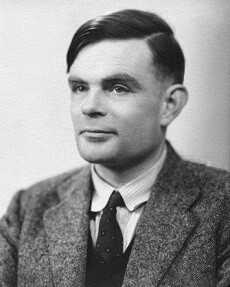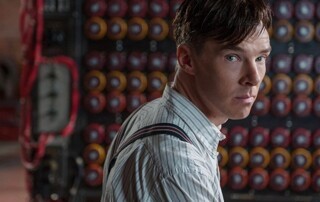Unreliable People
Inigo Thomas · Turing and Tolstoy
'Wild' would be a generous way to describe the use of historical detail in The Imitation Game, the movie about Alan Turing. 'Based on', 'sourced from', so they say, but what in The Imitation Game isn’t invention? And why? Anyone who's read Andrew Hodges’s biography of the mathematician, or Mavis Batey’s book about Dillwyn Knox, with whom Turing worked at Bletchley from 1939 until Knox's death in 1943, will ask themselves why the movie made up so much when the tales of Turing and his colleagues are unbeatable stuff.
Knox was one of four brothers that his niece Penelope Fitzgerald wrote about: the others were the theologian and detective writer, Ronald; Wilfred, a clergyman; and the editor of Punch, Edmund, who was Fitzgerald's father. One of Knox's favourite novels was Lewis Carroll’s Sylvie and Bruno Concluded, and a favourite passage was this: ’In Science,’ says a professor at the start of his lecture, ‘in fact in most things, it is usually best to begin at the beginning. In some things, of course, it’s better to begin at the other end. For instance if you wanted to paint a dog green, it might be better to begin with tail, as it doesn’t bite that end.’ The distinction between no sense and nonsense was important to Knox. He lived life as if he were in Alice’s Wonderland, seeing the German Enigma enciphering machine as the Jabberwock.
He had been a scholar of Greek at Cambridge, where he was worshipped by his contemporary Lytton Strachey. In the First World War, he was part of the team that deciphered the Zimmermann Telegram; in the 1920s, he cracked the code of the Zinoviev Letter. In The Imitation Game, Turing appears to break the Enigma code alone. Knox doesn't even feature. 'Turing is very difficult to anchor down,’ he once wrote. ‘He is very clever but quite irresponsible and throws out suggestions of all sorts of merit. I have just, but only just, enough authority and ability to keep his ideas in some sort of order and discipline. But he is very nice about it all.’ As for the decoding machine Benedict Cumberbatch stands in front of on the movie posters, it was invented by Polish mathematicians in 1938. Which isn't to say Turing wasn't a genius; only that he wasn't a solitary one.
‘The central problem with which he started and to which he constantly returned,’ Turing's mother later said, ‘is the extent and limitations of mechanistic explanations of nature.’ The movie doesn't much go into that, though it covers his conviction for gross indecency in 1952. In his last two years of life (he died in 1954) Turing read War and Peace and Anna Karenina. The novels were lent to him by Lyn Irvine, whose first book had been published by the Woolfs in 1931; in 1934 she married Turing’s friend and colleague Max Newman. ‘I knew that he read Jane Austen and Trollope as sedatives,' she later wrote,
but he was totally uninterested in poetry and not particularly sensitive to literature or to any of the arts, and therefore not at all an easy person to supply with reading matter. War and Peace proved to be in a very special way the masterpiece for him and he wrote to me expressing his appreciation of Tolstoy’s understanding and insight. Alan had recognised himself and his own problems in War and Peace and Tolstoy had gained a new reader of a moral stature and complexity and an originality of spirit equal to his own.
The letter to Irvine was destroyed, as many of Turing’s papers were after his death, but his mother confirmed the impression that War and Peace had made on her son in her own biography of him — a brave and unusual book.
With great pleasure he read Tolstoy — Anna Karenina and then War and Peace — and found both books deeply interesting and satisfying. He wrote to the friend who had lent him the books of the sense he had of being part of both novels, of finding himself and his friends in their pages. It was characteristic of his care and thoroughness that he made an immense family tree for Anna Karenina in order to keep all the connections in his mind as he read. (Actually, genealogies interested him very much.)
Whether people knew what they are doing, or are in command of their own fates, are aspects of Tolstoy’s novels. A passage from Turing's paper on 'Intelligent Machinery' questions whether a complete command of numbers is either necessary or desirable in a mathematician, any more than, as Tolstoy thought, historical knowledge allows a general or a politician to predict and therefore influence the outcome of events:
The machine has certain advantages over the mathematician. Whatever it does it can be relied upon, assuming no ‘breakdown’, whereas the mathematician makes a certain proportion of mistakes. I believe that this danger of the mathematician making mistakes is an unavoidable corollary of his power of sometimes hitting upon an entirely new method. This seems to be confirmed by the well known fact that the most reliable people will not hit upon really new methods.
In Sylvie and Bruno Concluded, nonsense is deployed to defeat the predictable. The professor who spoke of science moved on to axioms:
An Axiom, you know, is a thing that you accept without contradiction. For instance, if I were to say 'Here we are!’, that would be accepted without any contradiction, and it's a nice sort of remark to begin a conversation with. So it would be an Axiom. Or again, supposing I were to say 'Here we are not’, that would be...’
‘... a fib!’ cried Bruno.
‘Oh, Bruno!’ said Sylvie in a warning whisper. ‘Of course it would be an axiom, if the Professor said it!’
‘That would be accepted, if people were civil,’ continued the Professor, ‘so it would be another axiom.’
‘It might be an Axledum,’ Bruno said, ‘but it wouldn't be true.’


Comments
This might be putting too much historical weight on what is after all just an entertainment. But it does seem to me that we have lost contact with the past, even the recent past, which we like to see as populated by people just like ourselves, but in fancy dress. It might have been more interesting if the film had dealt seriously with the problem of managing a group of people many of whom are highly intelligent.
Instead we could indulge in the luxury of feeling morally superior to all those people in the 1950s who couldn't cope with gays, unlike ourselves in the more enlightened 21st century.